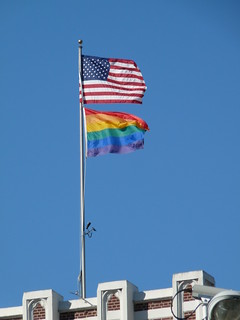"But my generation, the generation that can smell bulls--t, especially holy bulls--t, from a mile away, will not stick around to see the church fight gay marriage against our better judgment. It’s my generation who is overwhelmingly supporting marriage equality, and Church, as a young person and as a theologian, it is not in your best interest to give them that ultimatum."This is not, should not, be news to us. In the Pew research study of the "nones" (those people who identify with no faith tradition whatsoever). the overwhelming majority are progressive voters who believe in marriage equality. They cite religious institutions' meddling in politics and focus on rules among the main reasons for their disaffection. But here is a young person willing to single herself out and flat-out say it. I love you, church, but it's just not working for me, and here's why.
Now we know that our own denominational party line is not condemning of LGBT folk, at least at the national level. We passed numerous major pro-LGBT resolutions at our last General Convention, including the adoption of a rite to bless same-gender relationships. About two-thirds of our dioceses have agreed to use that rite in some form. In areas of the country where marriage equality is legal, every bishop with jurisdiction save one signed an amicus curae urging the Supreme Court to find for a repeal of Proposition 8 and DOMA. We have many congregations where identifying as LGBT will simply not be an issue.
 |
| US And Pride Flags over St. Paul's: Oakland, CA, photo by Flickr user rudisillart and shared under Creative Commons license. Click photo for details. |
And can we blame them? Disconnect yourself for a minute from what you know about the inside of your own parish, your own diocesan committees, NPR and the HuffPo Religion pages, and think about what the word Christian conjures up for the average American. Does Gene Robinson get as much as much airplay as Cardinal Dolan? Whose name you think more unchurched young people know: Jim Wallace or Pat Robertson? This means that we have to try that much harder, be that much more intentional in our efforts to be known as a church where there no outcasts. We need to name those who have specifically been excluded and invite them back in the door (or -- increasingly -- for the first time) with humility and a willingness to listen.
We are -- as a denomination -- famously squeamish about touchy subjects. Garrison Keillor can get away with teasing us about it, because he's one of us (okay, and because he's Garrison Keillor!), but remember it's been said that was basically our excuse for not taking a stand on slavery, too. In my work, I've heard some amazing things done in the name of not making a scene, such as, "We stopped flying the pride flag because we want to attract more young families with kids." Really? Did you ask them first if that's why they weren't coming? Look at these numbers again, please. And -- looking again at the real picture once you're inside many of our churches -- if they have a big problem with LGBT folks, are they going to feel comfortable anyway? I doubt many of us are ready to visit the don't-ask-don't tell days. My own congregation flies a rainbow flag 24 x 7 x 365, and we're crawling with kids!
| "Do we understand that a population which has been and continues to be the target of so much vitriol from some who purport to represent Christ will — if they don't see themselves specifically included in that welcome — assume there's an asterisk there and a footnote in invisible ink that says 'except you'?" |
All it takes is a few small signs. We encourage congregations to develop a welcoming statement that specifically includes reference to sexual orientation and gender identity or uses the words gay, lesbian, bisexual or transgender specifically, for the reason described above. We have -- with our ecumenical partners in the Believe Out Loud movement -- created graphics which "our folks" will recognize and understand, which you can pop into the margin of your web site or bulletin. We ask that you consider linking to our chapter or organizational web sites and Facebook presence, and we link to those who have identified as working with us.
In another blog post titled "Winning Back the Nation", Ms. Nash writes:
"Another chunk of people in this nation are gay. And an even bigger chunk consists of people who love those gay people and want them to be treated like they matter. What would happen to this nation’s perception of God if the church began an overwhelming campaign to love gay people unconditionally? What if churches began LGBT missions (NOT to fix them, to love them exactly how they are) and proved to those people that they do matter to the church and to God? People are pretty good at detecting empty promises. How would this nation react to an outspoken love from the church? Some people would react with rage, I know that. I know those people personally, they live in my building. Churches have this really huge opportunity to love the kinds of people that Jesus would have loved. The outcasts, the abused, the thirsty. Win the nation, Church."
Christian Paolino is the Diocesan Organizer for Newark and the Chair of the national Stakeholders' Council of Integrity USA.

No comments:
Post a Comment
Comments deemed inappropriate [such as hate speech, abusive language, off topic ranting, etc.] by Walking With Integrity may be removed.
Please comment with respect for all.